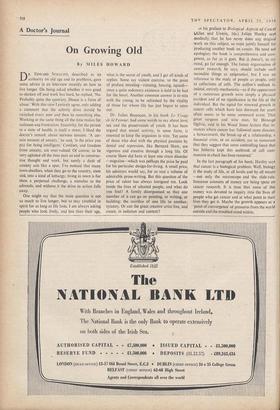A Doctor's Journal
On Growing Old
By MILES HOWARD DR. EDWARD STIEGLITZ, described as an authority on old age and its problems, gave some advice in an interview recently on how to live longer. On being asked whether it was good to slacken off and work less hard, he replied, 'No. Probably quite the contrary. Disuse is a form of• abuse.' With this view I entirely agree, only adding a comment that the activity drive should be switched every now and then to something else. Working at the same thing all the time makes for staleness and frustration. Inactivity, for the person in a state of health, is itself a stress. I liked the doctor's remark about nervous tension. 'A cer- tain amount of anxiety,' he said, 'is the price you pay for being intelligent.' Comfort, and freedom from anxiety, are over-valued. Of course, to be very agitated all the time puts an end to construc- tive thought and work, but surely a dash of anxiety acts like a spur. I've noticed that many town-dwellers, when they go to the country, soon sink into a kind of lethargy; living in town is for them a perpetual challenge, a stimulus to the adrenals, and without it the drive to action falls away.
One might say that the main question is not so much to live longer, but to stay youthful in spirit for as long as life lasts. I am always asking people who look lively, and less than their age, what is the secret of youth, and I get all kinds of replies. Some say violent exercise, to the point of profuse sweating—running, fencing, squash— since a quite sedentary existence is held to be bad for the heart. Another common answer is to, mix with the young, to be refreshed by the vitality of those for whom life has just begun to open out.
Dr. Julien Besancon, in his book Le Visage 'de la &Mille, had some words to say about love, sex and the preservatian of yOuth. It has been argued that sexual activity, in some form, is essential to keep the organism in trim. Yet some of those who deal with the physical passions by denial and repression, like Bernard Shaw, are vigorous and creative through a long life. Of course Shaw did have at least one stress disorder —migraine—which was perhaps the price he paid for his particular design-for-living. A small prke, his admirers would say, for so vast a volume of admirable prose-writing. But this question of the price of talent has always intrigued me. Look inside the lives of talented people, and what do you find? A family disorganised so that one member of it can go on painting, or writing, or building; the sacrifice of one life to another; tyranny. Or can the great creative artist live, and create, in isolation and content? in his preface to Biological Aspects of Can (Allen and Unwin, 16s.) Julian Huxley s modestly that he has never done any origi work on this subject, so must justify himself producing another book on cancer. He need apologise; the book is comprehensive and cc petent, as far as it goes. But it doesn't, to I mind, go far enough. The future organisation cancer research, he says, should include si recondite things as epigenetics, but I saw reference to the study of people as people, o as collections of cells. The author's outlook indeed, entirely mechanistic—as if the appears of a cancerous growth were simply a physi accident and of no significance in the life of individual. But the signal for renewed growth cancer cells which have lain dormant for ye often seems to be some untoward event. TI great surgeon and wise man, Sir Hene: Ogilvie, said in his Wood Jones lecture that stances where cancer has 'followed some disas a bereavement, the break-up of a relationship financial crisis, or an accident, are so numer( that they suggest that some controlling force tl has hitherto kept this outbreak of cell cc munism in check has been removed.'
In the last paragraph of his book, Huxley says that cancer is a biological problem. Well, biology is the study of life, at all levels and by all means —not only the microscope and the slide-rule. Immense amounts of money are being spent on cancer research. It is time that some of this money was devoted to inquiry into the lives of people who get cancer and at what point in their lives they get it. Maybe the growth appears at a 'point of convergence' of pressures from the world outside and the troubled mind within. 'er ys al for not rn- my of ch no
ily
is, ice cal
the
in
hat ge fin- er, ,a )us hat m-














































 Previous page
Previous page